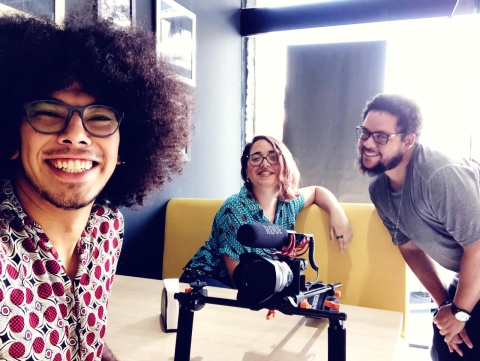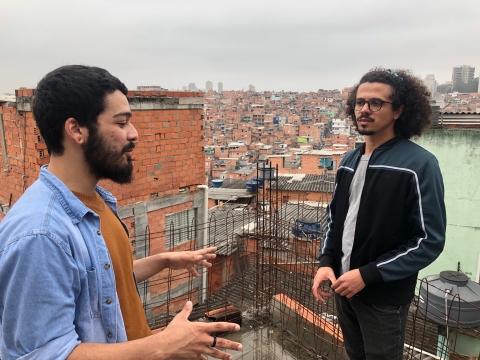
In 2010, Vagner de Alencar was one of 20 young people living in the favelas of São Paulo who took a journalism course offered by ICFJ Knight Fellow Bruno Garcez. He and the other trainees became the first bloggers for a citizen journalism site launched by Garcez that covered the massive city’s favelas — largely poor shanty towns outside the city that are rarely noticed by the media.
Almost 10 years later, Alencar is co-director of Agencia Mural, overseeing almost 90 correspondents in dozens of favelas around São Paulo. Mural has grown from a fledgling blog to a well-respected news site whose latest venture is a partnership with a major national TV news network. Mural now produces three television shows a week about the favelas for Band TV, from culture pieces to investigations of chronic problems such as infrastructure and sanitation.
The goal of Agencia Mural is twofold, Alencar says: to counter the negative stereotypes people have about favelas and the people who live in them, and to raise awareness of problems the government is ignoring.
Alencar grew up in Paraisópolis, one of the largest favelas in São Paulo. He covered it for Agencia Mural until recently, when he hired another Paraisópolis resident, Henrique Cardoso, a recent university graduate, to become the favela’s “Muralista.”
“The image is always negative of almost all the favelas,” Cardoso said while sitting in a Paraisópolis community center’s cafe and rooftop garden. “It bothers me because I was born and raised here, and I know that image isn’t true.”
Garcez conceived the idea for Mural with Izabela Moi, who was then the editor of a weekly education section at Folha de S.Paulo, Brazil’s largest newspaper. With ICFJ’s help, Garcez and Moi trained the first group of favela citizen journalists, and established Mural as a blog linked to Folha’s website. In 2015, Agencia Mural expanded, adding an independent news website while continuing the blog for Folha.
Moi is still a co-director of Mural, while Garcez — now a digital editor for the BBC in London — is a mentor. Looking back 10 years, Moi said none of the founders could have predicted what Mural would become.
“We didn't know each other,” she said. “We were simply relying on an idea that we, almost 25 people, believed, or wanted to believe, together: that we were filling a gap in information and news about São Paulo. What brought us here is this common shared mission, this vision of what is missing and the belief that we can all help to build it together.”
Her role now is largely in helping Agencia Mural become more self-sustainable. In addition to grants, the news service makes money from its partnerships with media such as Folha and Band TV, which pay Agencia Mural for content.
“We did this for many years with no money,” said projects editor Karol Coelho, also one of the original bloggers. “We did the work at night, on weekends. We always say, it takes patience and passion.”

Cardoso hopes that his coverage can lead to a better life for his neighbors in the favela, which has about 100,000 residents. He is working on a video piece for Mural’s Band TV show about promises the government has been making for years — to build a park and a hospital, and to turn a free-flowing stream into a concrete-lined canal that will no longer flood people’s homes whenever there is a heavy rain.
Many of the stories have had a positive impact for people who live in the favelas. One story showed how gaps between subway trains and platforms were causing 1,000 accidents a year. “Muralistas” measured the gaps and reported on the stations that had the biggest ones. After the story ran, the city government added metal extenders to the platforms to reduce the gaps — and the injuries.
Another impact has been on the careers of the Muralistas, Coelho said. Many have gone on to become reporters at Folha, the BBC and other important media organizations.
Cardoso would like to eventually work for a larger media organization. But for now, he wants to focus on covering the favela where he proudly lives in his family’s apartment, reached through a maze of winding streets and featuring an expansive view across the rooftops. At first, he wondered if his neighbors would want to talk about the issues that make their lives difficult. But to his surprise, everyone wanted to talk to him, and they are grateful to Mural for bringing those issues to light.
“People know about Agencia Mural,” he said. “They trust us. They know that we are here in the community with them.”
---------------------------------
If you would like to help support Agencia Mural, please visit this website: https://www.catarse.me/periferias